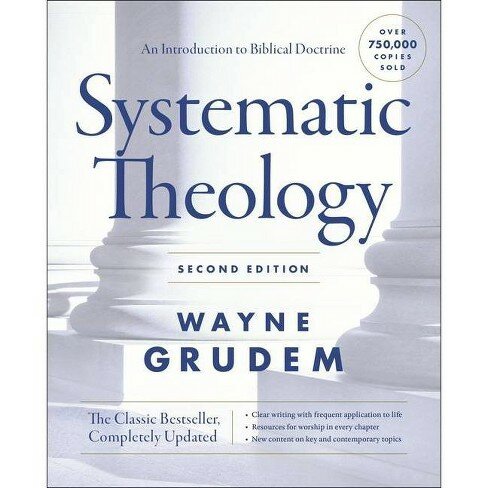Last summer, theologian Wayne Grudem announced that he would publish a second edition of his Systematic Theology later in 2020. My Bible study software made it available at a price that was tough to pass up, so I decided to download it and read it “next year.”
Fast forward to this spring when I decided the time was right to tackle such an in-depth study. I take seriously the biblical command to “love the Lord your God with all your heart and with all your soul and with all your strength and with all your mind, and your neighbor as yourself” (Luke 10:27, ESV), and I’ve placed an emphasis this year on loving God by engaging my mind. I consider myself a serious student of the Bible, and I’ve begun to dig into church history a little, but I had never read a systematic theology before.
I chose Grudem because I trust his theology and knew that I wouldn’t have major disagreements with him – and because of the sale price that was hard to resist. I don’t intend to turn this article into a review of the book, but I did find it accessible yet challenging rather than stuffy and overly academic. The length – 1,600 pages – can be daunting to start off, but it was a worthwhile and easy read in chapter-sized chunks.
So what did I learn from reading through a systematic theology for the first time? I didn’t walk away with any major new revelations about God or the Bible, but I did learn some things about myself and others. Here’s what reading a systematic theology taught me.
There are people who think more deeply than I do through theology, and I’m thankful for them.
Reading this deeply into theological concepts and applications made me eternally grateful for scholars. Even someone like me with 40 years of experience as a believer in Jesus and years of studying God’s Word can benefit from how deep scholars have paved the way for students of the Bible to learn more effectively.
I don’t have to learn Hebrew and Greek to study theology. Reading Grudem in tandem with my Bible software puts original language translation at my fingertips anytime I want or need it. Other people have laid the groundwork for me, and I appreciate their efforts.
Even though I didn’t learn anything major, I walked away with nuggets that deepened my knowledge and strengthened my faith.
Reading Grudem’s systematic theology didn’t shake or strongly affect my worldview, but I did learn some things in my study that benefitted me. I appreciated Grudem’s explanation of how the canon of scripture came together and how church leaders landed where they did. His exploration of God’s covenants with His people helped me understand the threads of the whole Bible better.
I even used an encouraging thought that I picked up from Grudem in a Communion thought at church recently. I was able to explain to the congregation that Jesus didn’t just command His followers to eat the bread and drink the cup as representations of His body and blood; His commands also serve as an invitation to believer to join in with generations of faithful people from the Passover to Easter to today. Those are just a handful of the encouraging and enlightening nuggets I picked up from reading Grudem.
Some of my theological and doctrinal thoughts solidified as well. My position on baptism by immersion and taking the Lord’s Supper every week are just a couple of the theological ideas that Grudem strengthened for me.
Our worldviews can sometimes turn into biases.
Wayne Grudem comes from a Reformed background, and though I agree with much of the Reformed theology and worldview, I don’t subscribe to it completely. For example, even though I believe in the sovereignty of God and that He predestines us for His purposes, I have a hard time calling myself a Calvinist. It’s natural to believe that Grudem would write his systematic theology through that lens of Reformed doctrine.
However, Grudem doesn’t always allow for room to agree to disagree with other views. He sometimes tries too hard to refute other ideas instead of simply comparing and contrasting. Sure, he gets paid the big bucks to be a scholar, but I sometimes saw his worldview as a bias against other ways of seeing God’s Word.
Nobody’s eschatology is all that convincing.
Eschatology, or the study of the end of days, has always been tricky. The end-time predictions in the Bible are inscrutable for a reason. Grudem explains the leading theories of eschatology in the book, and he advocates for his own position. The thing is, he doesn’t do a good job holding up his belief in what will happen in the end times. His explanations of other theories don’t hold up well either.
Here’s what I believe: we’re not meant to know too many details on what’s going to happen at the end of the world as we know it. And that’s okay, because our trust should be in God no matter what happens.
Theology isn’t just an academic exercise; it should lead us to worship God.
One of my favorite things that Grudem does in both editions of his systematic theology is include hymns that relate to the topic(s) of each chapter. In the new edition, he also includes contemporary worship songs that fit each chapter as well. It’s a neat way to tie each chapter and each concept into the way we worship God.
I believe that worship is far more than just singing a handful of songs on a Sunday. It’s a way of life for the serious believer and learning more about doctrine and about God can enhance a lifestyle of worship. Our spiritual and mental pursuits should always point us to Him.
—
I do think I’m a better student of God’s Word from having read through a hefty, serious systematic theology. I can’t wait to continue my pursuit of loving God with my mind as well as with my heart, soul, and strength.



Comments
Leave a Reply